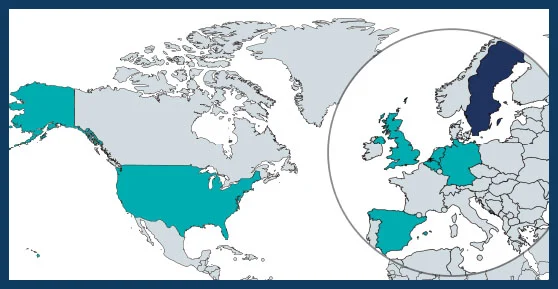12-2018 to 03-2022
€ 1,573,492
Christopher Raymond
Christopher.Raymond@slu.se
Swedish University of Agricultural Sciences (SLU), Alnarp, SWEDEN
Stockholm Resilience Centre, SWEDEN
International Union for Conservation of Nature, Brussels, BELGIUM
University of Göttingen, GERMANY
Fundació per a la Universitat Oberta de Catalunya, Barcelona, SPAIN
Scienseed, Madrid, SPAIN
The University of Edinburgh, UNITED KINGDOM
Vrije Universiteit, Amsterdam, THE NETHERLANDS
University of Illinois, Urbana, USA

Developing protected area (PA) management strategies that enhance biodiversity conservation while also supporting the needs of stakeholders is a major global challenge. Assessing the consequences of diverse visions on biodiversity, ecosystem services, and well-being across stakeholder groups remains a critical research gap which restricts guidance to decision making.
In partnership with local residents, protected area managers and diverse industry groups, we will examine the consequences of multiple visions for PA management, using mixed-method, participatory scenario planning tools, in four case study areas: Västra Harg (Sweden), Utrechtse Heuvelrug & Kromme Rijn region (The Netherlands), Sierra de Guadarrama National Park (Spain) and Denali National Park and Preserve (United States).
• Establish an integrative social-ecological approach for inclusive conservation that considers multiple visions and scenarios for PA management;
• Quantitatively assess the consequences of different scenarios and associated visions (related e.g., to tourism, agriculture, mining, recreation) on agro-biodiversity and biodiversity associated with semi-natural (protected) areas and cultural landscapes, and human well-being;
• Test how social learning about the consequences of each vision changes values and enables the development of collectively defined visions for PA management;
• Better understand how uncertainties can be dealt with and translated into more resilient PA management strategies;
• Propose inclusive governance models capable of informing PA decision-making at multiple scales;
• Communicate and disseminate project findings to diverse stakeholders within and across study areas.
The ENVISION project will result in the development of several communications and policy tools:
• A set of mixed methods that enable a more inclusive approach to the conservation of protected areas (termed: inclusive conservation);
• Development of local and regional knowledge alliances composed of key stake- holders for ongoing engagement in the different stages of research;
• Targeted outreach events to policy-makers and practitioners, including a business breakfast and side events at EU Green Week and IUCN World Conservation Congress;
• Timely policy and planning recommendations, in the form of fact sheets, presentations and brochures, to protected area managers to inform post-2020 de- bates on the conservation of biodiversity and ecosystems;
• A unique set of scenario planning techniques for identifying different community and industry visions for protected area management, and for understanding their consequences on biodiversity, ecosystem services and human well-being.